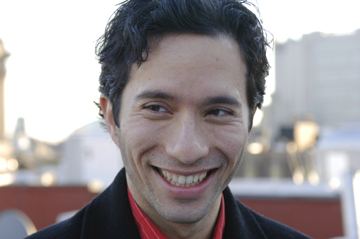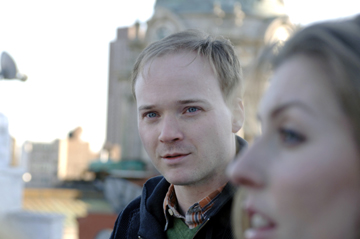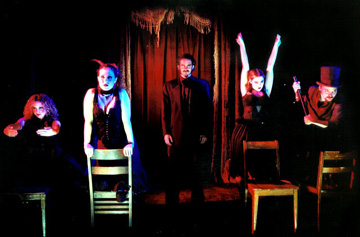It wasn’t much of a stretch, when a small group of TCU drama students decided to stage a play on the Horned Frog campus seven years ago, for them to pick the name Amphibian Productions for the new theatrical entity they’d formed.
![Culebro (center): ‘We want ... names like “Fort Worth” and “TCU” [to] become familiar in New York theater circles.’](https://www.fwweekly.com/wp-content/images/stories/images/archive/2007-02-21/feature_pic1_2-21.jpg) An easy choice, maybe — but also a prophetic one. Their first outing was Lanford Wilson’s Burn This, a drama about how a sudden death changes the relationships within a small circle of artists. It’s a famously difficult contemporary piece, since the motivations and even the facts behind the relationships are often murky. But the “Phibs” nailed it on opening night. “One review said it was the ‘simply stunning’ debut of a new theater company,” Amphibian co-founder Carman Lacivita recalled. “We didn’t have a company. We hadn’t even chosen a second play.”
An easy choice, maybe — but also a prophetic one. Their first outing was Lanford Wilson’s Burn This, a drama about how a sudden death changes the relationships within a small circle of artists. It’s a famously difficult contemporary piece, since the motivations and even the facts behind the relationships are often murky. But the “Phibs” nailed it on opening night. “One review said it was the ‘simply stunning’ debut of a new theater company,” Amphibian co-founder Carman Lacivita recalled. “We didn’t have a company. We hadn’t even chosen a second play.”
The group did choose a second play and one after that and never looked back. But they did look north — to New York City and the heart of American theater. And since then they have evolved into a truly amphibious creature — a theater troupe that stays grounded on Fort Worth’s terra firma and is also able to navigate the swift and heady currents of off-Broadway New York, with a welcoming lily pad at Rutgers University in New Jersey as a stopping-off point in between. Most years, the company divides its productions between Fort Worth and New York. In the process, the Phibs have opened a pipeline between the two cities that has allowed actors, directors, and designers to travel back and forth between vastly different cultural worlds, mounting shows here by internationally feted — though often non-commercial — playwrights, introducing New York performers to the wonders of Tex-Mex and line dancing, and giving Fort Worth artists a toehold in the big time.
Ultimately, said Amphibian artistic director Kathleen Anderson Culebro, “We want to establish a long-term reputation where names like ‘Fort Worth’ and ‘TCU’ become familiar in New York theater circles, where they start to associate a certain kind of quality and daring” with those names. With the select but generously hailed production history the group has accumulated so far, the prospects for that kind of artistic evangelism are looking better and better. When Culebro talks about New York City, an excitement creeps into her voice — partly because she’s a self-confessed stage fanatic, and partly from nostalgia. She was born and raised in a university-educated, upper-middle-class family in Mexico City. Her father started the Mexican national chain of Chili’s-like restaurant/bars known as Señor Frog’s — the name a harbinger of his daughter’s educational and professional future. Culebro, 43, remembers a Thanksgiving holiday trip to New York when she was a little girl. Her mother, long a patron of the visual and performing arts in culture-intense Mexico City, wanted to introduce Kathleen to the theater. But the 10-year-old wanted to stay in the hotel room and soak in some mid-1970’s prime-time American tv. “I understand why young people today [usually go for television over live theater],” she said with a laugh. “I was fascinated by American shows.”
Instead, she was hauled off to see the Broadway musical Pippin with Ben Vereen and Susan Sarandon. Sitting in such relatively close proximity to live actors saying and doing things she’d previously seen only on television and movie screens, Culebro was instantly, irrevocably hooked. She has made regular treks to the city’s theaters ever since. But there are a couple of other, less typical reasons she rhapsodizes about New York: As a playwright, she has just watched her second NYC show, La Llorona, receive its world premiere off-Broadway at the Beckett Theater, right next to a staging by one of her heroes, the erudite and misanthropic Wallace Shawn. Her first New York production, A Leopard Complains of Its Spots, debuted off-off-Broadway seven years ago, just after Amphibian was formed. And her sister, Laura Anderson Barbata, a New York-based visual artist, serves as one of Culebro’s main connectors between that city and Cowtown. Culebro arrived in the U.S. at the age of 14 with her family. She earned a degree in Spanish and French literature from Brigham Young University, married a doctor, and moved with him to Fort Worth in 1993 to set up his practice. “I was always a closet playwright,” Culebro said, “but I had no idea how to get my foot into theater.” At the time, Texas Christian University offered no playwriting program, so Culebro pursued a general theater degree that brought unexpected benefits — she discovered she had talent for costume and set design and especially for stage makeup. Her marriage dissolved, but her theatrical muscles strengthened. She’s now an adjunct instructor teaching stage makeup in TCU’s theater department.
Lacivita, now a 29 year-old TCU grad and Phib artistic associate, remembers one of the first times he met Culebro: She applied shockingly good old-age makeup to his undergraduate face for the role of the stifling dad in John Osborne’s Look Back in Anger. “I showed a picture to my parents [back in San Antonio], and they said, ‘You look just like your great-grandfather.'” In 2000, Culebro, Lacivita, Chad Jung (now the Phibs’ lighting designer), and four other TCU students, grads, and faculty members decided that their attitudes and tastes were so simpatico that they could and should work together long-term. Partly as a nod to her dad’s restaurant chain, Culebro chose the banner name Amphibian Productions, under which they staged Burn This, and the newly christened Phibs built from there. They assembled a board of directors and filed to get nonprofit tax status. And they were already drawing fans. One person who saw Burn This and wanted to collaborate with Amphibian was Jonathan Fielding, a Fort Worth native and then a TCU student. He’d been performing since he was a kid in public school and church shows and volunteered as an usher at Circle Theatre, among other venues. For the Phibs, he did everything from helping out at the box office to understudying a role in the 2001 New York premiere of Culebro’s Leopard. “As I saw they needed more help, I pushed my way in,” Fielding, now 29, said. “I loved what they were doing, and, even better, I found out that I really liked these people and we had a lot in common, artistically speaking.” He became the group’s fourth artistic associate in 2003.
TCU doesn’t offer a graduate program in theater, and Fielding said that actually worked to his advantage. “I feel like I got the chance to log stage time the instant I hit campus,” he said. “That’s not true at many college theater programs across the country, where the grad students get all the good assignments. As a freshman, I got to start in immediately acting, directing, and designing.” Since then, the loose organization with a developing reputation has grown to include a dozen or so friends who identify themselves as Phibs — including a New York University speech professor, members and students of both Los Angeles’ legendary comedy troupe The Groundlings and Chicago’s Second City, and trainees at the London Academy of Theater. Most of them have TCU or Rutgers on their resumés, and when the right role pops up and their own careers and private lives allow, they come back to “Camp Phib.” Fort Worth may be the laid-back home base for the Amphibians, but their influences and the orbits in which they travel go far beyond the city or Texas.
 Culebro and Lacivita cite the same theatrical role model for their far-flung group of performers: Chicago’s Steppenwolf Theater, co-founded by John Malkovich and Gary Sinise. Those actors established a home company, went on to gain greater success with outside projects, and made a lot of talented friends all over the country. Yet they return to Chicago as schedules permit, with new artists in tow, to tread the Steppenwolf boards. Something similar is happening with the Amphibians. Of the original seven, the company has four artistic associates — two are Fort Worth natives, and a third was born in San Antonio. Culebro is by some years the eldest, though not necessarily the most veteran as far as stage experience. The Phib-Fort connection is strong, but only Culebro currently lives here; the other three have moved to New York City to establish theatrical careers there. (All the Phibs also pursue independent projects.) In addition to the top four are what Amphibian calls its “company members,” although the term “collective” might be more accurate: It’s a pool of past collaborators in Fort Worth, New York, and other cities from which the company regularly draws.
Culebro and Lacivita cite the same theatrical role model for their far-flung group of performers: Chicago’s Steppenwolf Theater, co-founded by John Malkovich and Gary Sinise. Those actors established a home company, went on to gain greater success with outside projects, and made a lot of talented friends all over the country. Yet they return to Chicago as schedules permit, with new artists in tow, to tread the Steppenwolf boards. Something similar is happening with the Amphibians. Of the original seven, the company has four artistic associates — two are Fort Worth natives, and a third was born in San Antonio. Culebro is by some years the eldest, though not necessarily the most veteran as far as stage experience. The Phib-Fort connection is strong, but only Culebro currently lives here; the other three have moved to New York City to establish theatrical careers there. (All the Phibs also pursue independent projects.) In addition to the top four are what Amphibian calls its “company members,” although the term “collective” might be more accurate: It’s a pool of past collaborators in Fort Worth, New York, and other cities from which the company regularly draws.
Each year, the group puts on three or four productions and an ongoing series of staged readings, some in Fort Worth, some in New York, and some produced in both cities. In addition to serving as designer on many Phib shows, Culebro handles most of the administrative stuff — grant applications, board meetings, venue logistics, fund raising — but everyone gathers to make plans at monthly teleconferences. The other breeding ground for the company has been Rutgers, whose Mason Gross School of the Arts has a nationally renowned graduate theater program. Several of the original Phibs, as well as other TCU drama graduates, wound up continuing their educations there, and the college became an unofficial pit-stop on the Amphibian route between Fort Worth and New York. The Rutgers grad unit is fit to burst with artists who’re well-connected in the inner circles of off-Broadway and off-off-Broadway producers. “New Brunswick is about 45 minutes away from New York City,” Lacivita explained, “so a lot of TCU undergrads apply there to start out early [auditioning for parts in NYC]. Amphibian started making friends with artists at Rutgers and in New York City.”
In Phibspeak, Fort Worth is unofficially “Camp Amphibian” — a place where out-of-town stage artists can come for a month to six weeks, focus exclusively on rehearsals for opening night at TCU’s Hayes or Buschman Theater, and maybe relax for an evening or two at Billy Bob’s or Joe T. Garcia’s. When the company mounts a production in New York, Culebro’s familial connections come into play. Her sister’s studios function as the New York office of Amphibian Productions. She’s been “a huge source of support for me and Amphibian,” Culebro said. Barbata works closely with other Hispanic artists and intellectuals, and she organizes trips to Mexico to conduct art projects with the indigenous peoples there. Culebro’s own work is similarly influenced: Her non-Amphibian shows in New York, La Llorona and Leopard, deal at least in part with the collision of traditional Latino culture and the faster-paced, more fickle currents of American society.
In contrast to Fort Worth’s summer camp role, New York City, for Culebro at least, is “boot camp,” a place both loved and hated, where “there’s so much inherent stress.” Competition for theatergoers’ attention and money is exponentially greater, and audiences tend to be more finicky and jaded. “If you start thinking you’re too much the fabulous artist, it puts you in your place very fast,” she said. But “for better or for worse, New York credits on a professional artist’s resumé make a big difference.” If Fort Worth doesn’t offer the cachet of New York, it frequently can provide a little more in the way of R&R for struggling actors. Once they’re hired for an Amphibian gig in Fort Worth, out-of-town performers get a small paycheck and a month or so of Cowtown hospitality. Staying at the home of a board member (or the homes of Culebro and Jonathan Fielding’s parents), they get to concentrate full-time on rehearsals for the show’s two-weekend run, hit the gym regularly, maybe take a day trip to Dallas, and sample the Tex-Mex food and honkytonk music that have largely eluded them up north.
The relaxation and hospitality are key factors in Amphibian Productions’ developing reputation, Culebro insists: She said visiting artists have so far unanimously welcomed the experience as a respite from the speeding-train sensation of a daily New York schedule. Lacivita confided that the Joe T. Garcia’s part of the treatment often floors the New Yorkers, especially the women, with its portion sizes. “These are women who do film and tv auditions as well, and they’re extra-paranoid about their weight,” he said. “They wind up sharing their plates with three or four people at the table.” “Just having access to an outdoor swimming pool amazes some of these actors,” Fielding said with a laugh. Networking and mutual trust are essential to the Amphibian Productions model, which goes something like this: Scripts can be suggested for consideration by pretty much any actor in the company, with artistic directors making the final choices. They often pick material that’s well-suited to the skills of a lead performer they’ve previously worked with; Culebro also hosts small, informal casting calls with New York and Fort Worth actors and directors whose work she has admired. But Lacivita and Fielding, as full-time New Yorkers and active Rutgers alumni, do the bulk of the head-hunting for lead and supporting roles. Fellow TCU and Rutgers graduates get first dibs.
Some stage directors might take umbrage at one or more lead actors being cast first and then presented to the director as a package deal. But Sharon Benge, who chairs the interdisciplinary acting/directing program at Texas Woman’s University and has headed up professional shows at virtually every major company in Fort Worth and Dallas, sees this practice as a form of quality control. She has guest-directed a stage adaptation of Virginia Woolf’s A Room Of One’s Own for Amphibian, as well as a staged reading of a script about Vincent Van Gogh’s pre-painter years. “I’m very high on how the Phibs have chosen to operate their company,” she said. “They go out of their way to work with consummate artists, and their connections are superb. Casting is of paramount importance to them, and that only helps a director. Once you’re hired to do one of their shows, they provide complete artistic and moral support. If I say I need to hire a 48-year-old Irish man for a supporting role, by God, they’ll find one for me if I can’t.”
 So far, Amphibian’s Fort Worth performances have included full productions at TCU and staged readings at the Modern Art Museum of Fort Worth. Their productions take place during the summer months, a time when the TCU stages aren’t so busy and out-of-town actors find themselves with a lot of down time. “People might be surprised at how actors [from New York] are willing to come to Texas for a month in the summer,” Lacivita said. “Summer stock, which is harder and requires a lot of touring, is the only other option for a lot of them.” Another part of the Phibs’ allure is their taste for ambitious, sometimes bleak, and almost always irreverent fare. Past shows include Matt and Ben, a venomous romp about the “accidental” creation of Matt Damon and Ben Affleck’s Oscar-winning script, Good Will Hunting (the play was written to be performed by female actors in the male leads); The True History of the Tragic Life and Triumphant Death of Julia Pastrana, a play about the Victorian sideshow “ape-woman,” which was performed via voice and sound effects in almost total darkness; and the world premiere of 4 Edges, a quiet reverie about loneliness and connection that begins when a wounded nature photographer seeks aid from a woodcutter who speaks an unidentifiable language.
So far, Amphibian’s Fort Worth performances have included full productions at TCU and staged readings at the Modern Art Museum of Fort Worth. Their productions take place during the summer months, a time when the TCU stages aren’t so busy and out-of-town actors find themselves with a lot of down time. “People might be surprised at how actors [from New York] are willing to come to Texas for a month in the summer,” Lacivita said. “Summer stock, which is harder and requires a lot of touring, is the only other option for a lot of them.” Another part of the Phibs’ allure is their taste for ambitious, sometimes bleak, and almost always irreverent fare. Past shows include Matt and Ben, a venomous romp about the “accidental” creation of Matt Damon and Ben Affleck’s Oscar-winning script, Good Will Hunting (the play was written to be performed by female actors in the male leads); The True History of the Tragic Life and Triumphant Death of Julia Pastrana, a play about the Victorian sideshow “ape-woman,” which was performed via voice and sound effects in almost total darkness; and the world premiere of 4 Edges, a quiet reverie about loneliness and connection that begins when a wounded nature photographer seeks aid from a woodcutter who speaks an unidentifiable language.
Harry Parker, chair of Texas Christian University’s theater department for the past three years, offers unqualified praise for Culebro and her cohorts. He is set to direct a staged reading of John Belluso’s Nervous Smile for Amphibian at the Modern in April. “I would say that Amphibian Productions is both admirably cautious and admirably brave,” Parker said. “They are admirably cautious because they haven’t allowed themselves to grow too quickly.” Using TCU’s stage facilities on a limited annual basis, he said, “has allowed them to concentrate all their fund raising on artistry. I use them as an example to students that there’s more than one way to skin the theatrical cat. Striving to secure your own private facility brings a whole lot of financial and maintenance headaches, and it can kill a company. “On the other hand, I say they’re admirably brave because their choice of material can be fearless, especially in a market like Fort Worth.”
Fort Worth has worked out well so far as a venue. Getting shows off the ground in New York’s theatrical “boot camp” has proven a bit more daunting. Under their own banner, the Phibs have thus far staged three New York shows — Julia Pastrana, the fantastical romance Leonce and Lena, and 4 Edges. Despite the city’s reputation for crowded spaces and limited availability, Culebro claims that, if the Amphibians plan far enough ahead, securing a venue for a live show isn’t too tough. “It usually comes down to a cost-benefit analysis,” she said. As in, “This space is a great deal, but it’s all the way over on Avenue A away from theater foot traffic. The other space is smaller and more expensive, but it’s on 42nd Street. “It’s rarely an ideal situation, and I try to warn my [TCU] students about the real world,” she said. “They complain about bleed noise from the orchestra theater next door. Well, stage a show at the Public Theater [in New York], and you’ll feel the subway running underneath you throughout the evening.”
And the transit system isn’t the only source of rumblings that Fort Worth artists must get used to when they work in New York. Audiences and critics alike there tend to be less forgiving and more forthright in expressing their opinions — sometimes in the middle of the show. The group performed Julia Pastrana in both cities, and Culebro noted that Fort Worth audiences were still as statues, barely breathing. A couple of audience members panicked at first. In the Greenwich Village version, ticketbuyers were much more vocal and participatory, loudly whispering “What was that sound?” and “Oh my God!” if the show moved them. Benge said such sociological comparisons and contrasts are what make the troupe so singular. “I don’t know how cost-effective [all the flying back and forth] is, but the idea of watching two very different cities react to the same script is fascinating to me as a director.”
The two-city productions provide some unique challenges. “We have to be careful with the material we pick for New York,” Culebro said. “If it’s already been done there, even if most people didn’t see it, they won’t come back. And while comedies play well in Fort Worth, most New York theatergoers want more cynicism in their shows.” Which might explain the reaction of critic Neil Genzlinger when he scribbled the Phibs’ first New York Times review. The 2002 notice was for Leonce and Lena, an adaptation of an 1836 German play that featured two star-crossed young lovers from clashing, mythical royal families. “Perhaps it was revolutionary in its time,” the critic wrote, “but today it seems more like a wafer-thin story buried in a mound of spun sugar.” Still, he raved about the energy and timing of the performers and the show’s sumptuous design, and concluded with, “When all these talents are turned loose on a play that is more than a historical curiosity, watch out.”
As a non-Phib solo playwright, Culebro garnered a New York Times notice just two weeks ago for La Llorona, translated in English as The Crying Woman and produced by a company called Stageplays Theatre. The show puts a bleakly comic and even mystical spin on a Norte Americano couple who arrive south of the U.S. border in an attempt to sell an American brand of Mexican food to the locals. While offering some pointed reservations, the Times ultimately said, “Ms. Culebro is clearly a writer of promise, aided by warm and winning performances and a fluid staging directed by Tom Ferriter.” Variety proclaimed the show “too interesting to be dismissed. The playwright makes some good points about the American invasion of Mexican culture, demonstrating sly humor along the way.” For Culebro, the praise and condemnation fall on deaf ears. “When I’m producing [someone else’s play], I want to know if the critics are coming and what they say,” she explained. “But if it’s my own play, my baby” — she paused, and the cringe was practically audible — “I don’t want to know.”
Either way, a Culebro script produced off-Broadway is another notch on her resumé, which means one more set of contacts that the Amphibian collective can rely on at some future point. “One for all and all for one” is the sort of super-hero ethos that has served them well so far, on land and on sea. In the end, Culebro and the other artistic associates of Amphibian agree with Harry Parker: Slow growth is the best, and perhaps the only, way to operate such an unwieldy organizational model. Everyone wants to further their own theatrical careers as actors, writers, and designers on more prestigious playing fields like New York, while simultaneously retaining some kind of fidelity to Fort Worth and TCU, which they feel has taught them so much as artists. So far, Amphibian summer shows at the TCU theaters have been the crucible of that Fort Worth dedication. A major benefit for TCU undergrads — and Fort Worth audiences in general — has been the chance to be exposed to up-and-coming New York talent.
 Culebro echoes the common sentiment that, right now, nobody wants to get so busy or so successful that they’ll rule out at least occasionally returning to Fort Worth for an Amphibian show: “There may not always be [an Amphibian] show or a reading in New York City,” Culebro said. “We want to establish much more of a New York presence, but every year is different. When it works out, it works out. But all of our company members know that we want them to succeed outside Amphibian.” She believes that can only solidify the foundation they’ve been building for the past seven years. In keeping with that plan for modest expansion, Culebro’s current goals are relatively simple and attainable: Keep building an audience in Fort Worth, redesign the group’s web site and associated merchandise with the hopes of “branding” Amphibian Productions in the minds of theatergoers, and mount an off-Broadway premiere of the British real-estate thriller A Buyer’s Market, which they produced in Fort Worth two years ago.
Culebro echoes the common sentiment that, right now, nobody wants to get so busy or so successful that they’ll rule out at least occasionally returning to Fort Worth for an Amphibian show: “There may not always be [an Amphibian] show or a reading in New York City,” Culebro said. “We want to establish much more of a New York presence, but every year is different. When it works out, it works out. But all of our company members know that we want them to succeed outside Amphibian.” She believes that can only solidify the foundation they’ve been building for the past seven years. In keeping with that plan for modest expansion, Culebro’s current goals are relatively simple and attainable: Keep building an audience in Fort Worth, redesign the group’s web site and associated merchandise with the hopes of “branding” Amphibian Productions in the minds of theatergoers, and mount an off-Broadway premiere of the British real-estate thriller A Buyer’s Market, which they produced in Fort Worth two years ago.
Meanwhile, the individual Amphibians continue to swim along their own professional streams, while still mindful of the shore from which they embarked. Lacivita, whose most recent New York gigs included a workshop reading of a new Elaine May play with Alan Alda, Lee Grant, and Marian Seldes, is not ashamed to confess the security-blanket function that a Fort Worth home base can offer. “As a working actor in New York, you have good months and bad months,” he said. “You never know how your luck is going to run. A company like Amphibian gives me a little bit of psychological security, in the way of: ‘I always have this project to work on and these people to support me.'”
You can reach Jimmy Fowler at jimmy.fowler@fwweekly.com.












